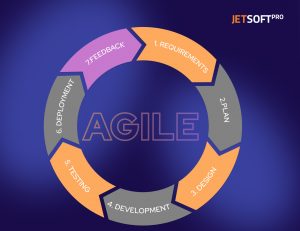Agile methodology is an iterative and collaborative approach to software development that emphasizes flexibility, adaptability, and customer-centricity. It originated as a response to the shortcomings of traditional waterfall methods, which followed a linear and sequential process. In contrast, Agile breaks down the development process into smaller iterations, allowing for continuous feedback, improvement, and quick adaptation to changing requirements.
Agile methodology plays a crucial role in startup software development due to the unique challenges and opportunities faced by startups. Startups operate in highly dynamic and uncertain environments, where speed, flexibility, and efficient resource allocation are essential for survival and growth. Agile methodology aligns well with the needs of startups by providing a framework that enables rapid development, quick iterations, and early delivery of valuable software. It fosters collaboration, empowers cross-functional teams, and facilitates effective communication, resulting in higher customer satisfaction and better outcomes for startups.

In this article, we will explore the advantages of Agile methodology in startup software development, examine the challenges associated with its implementation, highlight real-world examples of successful adoption, and discuss the future of Agile in the startup ecosystem.
Advantages of Agile Methodology in Startup Software Development
1. Flexibility and Adaptability
One of the key advantages of Agile methodology in startup software development is the inherent flexibility and adaptability it offers. Startups often operate in fast-paced and unpredictable environments where requirements and priorities can change rapidly. Agile allows startups to respond to these changes effectively and efficiently. Here are two important aspects of flexibility and adaptability provided by Agile:
- Rapid Iterations and Feedback Loops
Agile methodology promotes the use of short development cycles called iterations or sprints. These iterations typically last one to four weeks, during which a small portion of the software is developed, tested, and delivered. This iterative approach enables startups to quickly gather feedback from stakeholders, including customers, and incorporate it into the next iteration. By receiving early and regular feedback, startups can make necessary adjustments and improvements throughout the development process, resulting in a product that better meets customer needs and expectations.
- Quick Adaptation to Changing Requirements
Startups often face evolving market conditions, emerging technologies, and shifting customer demands. Agile methodology provides a framework that allows startups to adapt quickly to these changes. Unlike traditional methodologies that lock in requirements upfront, Agile embraces change and welcomes it as an opportunity for improvement. The use of flexible product backlogs and prioritization techniques enables startups to reprioritize and rework features based on changing market dynamics or customer feedback. This adaptability empowers startups to stay ahead of the competition, seize new opportunities, and respond effectively to market shifts.
2. Enhanced Collaboration and Communication
Effective collaboration and communication are essential for the success of any startup software development project. Agile methodology places a strong emphasis on fostering collaboration and improving communication within teams. Let’s explore some of the ways Agile enhances collaboration and communication in startup software development:
- Cross-functional Teams
Agile promotes the formation of cross-functional teams composed of individuals with diverse skills and expertise. These teams typically include developers, designers, testers, and business analysts, among others. By bringing together individuals with different perspectives and capabilities, Agile encourages collaboration and knowledge-sharing. Cross-functional teams work together throughout the development process, ensuring a holistic approach to problem-solving and decision-making. This collaboration eliminates silos, promotes a shared understanding of project goals, and accelerates the development process.
- Daily Stand-up Meetings
Daily stand-up meetings, also known as daily scrums, are a core practice in Agile methodology. These short, focused meetings involve the entire team and serve as a platform for communication, coordination, and progress updates. Each team member answers three questions: What did I accomplish yesterday? What am I planning to do today? Are there any obstacles in my way? This regular interaction keeps everyone aligned, identifies potential bottlenecks, and fosters a sense of accountability within the team. Daily stand-up meetings provide a forum for addressing issues promptly, making adjustments, and maintaining project momentum.
- Transparency and Accountability
Agile methodology promotes transparency and accountability among team members. The use of visual management tools, such as Kanban boards or task-tracking software, allows everyone to have visibility into the progress of tasks and the overall project. This transparency helps identify any bottlenecks or areas requiring attention, enabling the team to address them promptly. Additionally, Agile methodologies like Scrum include ceremonies like sprint planning, review, and retrospective meetings, which further facilitate open communication and collaboration. By promoting transparency and accountability, Agile ensures that team members are aware of their responsibilities, and progress is visible to all stakeholders.
3. Early and Continuous Delivery of Valuable Software
Another significant advantage of Agile methodology in startup software development is the emphasis on early and continuous delivery of valuable software. This approach provides several benefits for startups:
- Minimum Viable Product (MVP) Approach
Agile encourages startups to adopt a Minimum Viable Product (MVP) approach. Instead of attempting to develop a full-featured product from the outset, startups focus on delivering a basic version of their software that addresses the core needs of the target market. This allows startups to quickly validate their product concept, gather user feedback, and make informed decisions about future development. By prioritizing the delivery of a minimal but valuable product, startups can reduce time-to-market, minimize resource wastage, and gain early insights into market viability. Our team has crafted an article on MVP development and its potential to attract funding from investors.
- Iterative Development and Continuous Integration
Agile methodology promotes iterative development and continuous integration practices. Rather than working on a long, linear development cycle, startups break down their work into small, manageable iterations. Each iteration builds upon the previous one, with regular integration of new features and bug fixes. This iterative approach enables startups to release new functionality to customers incrementally, ensuring that valuable software is delivered frequently and consistently. By continuously integrating and testing code, startups can identify and address issues early on, reducing the likelihood of major setbacks.
Challenges and Mitigation Strategies for Agile in Startup Software Development
1. Lack of Prioritization and Scope Creep
One of the challenges that startups often face when implementing Agile methodology in software development is the lack of proper prioritization and the risk of scope creep. Here are two strategies to address these challenges:
- Clear Product Vision and Roadmap
To mitigate the lack of prioritization, startups need to establish a clear product vision and roadmap. This involves defining the long-term goals and objectives of the software product and breaking them down into smaller, actionable steps. By having a clear product vision, startups can align the team’s efforts towards delivering the most valuable features first. The product roadmap provides a high-level plan that outlines the features and functionalities to be developed in each iteration, ensuring that the team stays focused on delivering the highest priority items.
- Effective Backlog Management
Effective backlog management is crucial for preventing scope creep and maintaining prioritization. The product backlog is a dynamic list of features, user stories, and tasks that need to be developed. Startups should regularly review and prioritize the items in the backlog, considering the value they bring to the product and the needs of the target market. By constantly reassessing and reprioritizing the backlog, startups can ensure that the team is working on the most important and valuable features at any given time.
2. Resource Constraints and Time Pressure
Resource constraints and time pressure are common challenges faced by startups. Agile methodology offers strategies to address these challenges:
- Lean Development Principles
Startups can adopt lean development principles to optimize resource utilization and minimize waste. Lean principles, such as reducing unnecessary documentation, focusing on essential features, and eliminating bottlenecks, help startups streamline their development process. By eliminating non-value-adding activities and focusing on the most critical tasks, startups can make the most of their limited resources and deliver software efficiently.
- Continuous Improvement and Kaizen
Agile encourages a culture of continuous improvement and learning. Startups can implement regular retrospectives to reflect on the development process, identify areas for improvement, and make necessary adjustments. By promoting a mindset of continuous improvement, startups can optimize their workflows, streamline processes, and identify opportunities to save time and resources. This iterative approach to improvement, known as Kaizen, ensures that startups are constantly striving to become more efficient and effective in their software development efforts.
3. Balancing Agility with Stability and Scalability
Startups often struggle to balance the need for agility with the requirements for stability and scalability. Here are two strategies to address this challenge:
- Technical Debt Management
Technical debt refers to the accumulated compromises or shortcuts taken during development that may impact the stability and maintainability of the software over time. Startups should prioritize managing technical debt by allocating time for refactoring and addressing critical issues. By actively managing technical debt, startups can ensure the long-term stability, maintainability, and scalability of their software.
- Scalable Architecture and Infrastructure
Startups need to design their software architecture and infrastructure with scalability in mind. By anticipating future growth and designing systems that can handle increased demand, startups can avoid costly rework and disruptions in the future. Embracing practices such as microservices, containerization, and cloud computing can provide the flexibility and scalability required to support the growth and changing needs of the startup.
Real-world Examples of Agile Adoption in Startup Software Development
Agile methodology has gained significant popularity and proven its effectiveness in the startup ecosystem. Many successful startups have embraced Agile principles and practices to drive their software development efforts. Let’s explore three real-world examples of startups that have successfully adopted Agile methodologies: Spotify, Airbnb, and Slack.

Spotify
Spotify, the popular music streaming platform, is renowned for its successful implementation of Agile practices. Spotify’s engineering culture is deeply rooted in Agile principles, enabling them to rapidly innovate and adapt to market demands. They have adopted a unique Agile framework called the Spotify Model, which combines Scrum practices with cross-functional teams known as squads, tribes, chapters, and guilds.
Squads are self-organizing teams responsible for developing specific features or components. Tribes consist of multiple squads working on related areas. Chapters and guilds facilitate knowledge sharing and cross-team collaboration. This Agile structure allows Spotify to scale its development efforts while maintaining flexibility and autonomy within teams. They emphasize continuous improvement, transparency, and collaboration, fostering a culture of innovation and delivering value to millions of users worldwide.
Airbnb
Airbnb, the global online marketplace for accommodations and experiences, has successfully embraced Agile methodologies to drive its software development initiatives. The company operates in a dynamic and competitive market, necessitating rapid product iterations and customer feedback incorporation.
Airbnb utilizes Agile practices, such as Scrum and Kanban, to manage its software development projects. They work in cross-functional teams that include designers, engineers, and product managers. These teams collaborate closely, focusing on delivering value to users in short development cycles. The iterative approach allows them to test new features, gather feedback, and make data-driven decisions to enhance the user experience continuously.
Airbnb also emphasizes customer-centricity through usability testing and user research. By adopting Agile methodologies, Airbnb can quickly adapt to changing market needs, deliver innovative features, and maintain a competitive edge in the online travel industry.
Slack
Slack, the widely used team collaboration platform, is another prime example of Agile adoption in startup software development. Slack’s success can be attributed, in part, to their Agile approach, which has allowed them to iterate rapidly, deliver valuable software, and gain a significant market share.
Slack’s engineering teams embrace Agile methodologies, employing Scrum and Kanban practices. They work in small, autonomous teams that have end-to-end responsibility for specific features or components. Daily stand-up meetings and regular retrospectives ensure continuous communication, coordination, and improvement.
Slack values customer feedback and incorporates it into their product development process. They release updates frequently, allowing users to provide feedback, report issues, and request new features. This iterative approach enables Slack to deliver a product that aligns closely with user needs while fostering customer loyalty and satisfaction.
By adopting Agile methodologies, Spotify, Airbnb, and Slack have been able to navigate the challenges of startup software development successfully. They have leveraged Agile principles to drive innovation, adapt to market changes, and deliver valuable software products. These real-world examples highlight the benefits of Agile methodology in the startup ecosystem and serve as inspiration for other startups looking to adopt Agile practices.
In conclusion, Agile methodology provides startups with the flexibility, adaptability, collaboration, and early delivery of valuable software they need to thrive in the competitive landscape. By following in the footsteps of companies like Spotify, Airbnb, and Slack, startups can leverage Agile methodologies to accelerate their software development efforts, respond effectively to customer needs, and achieve long-term success.
Conclusion
Agile provides startups with a framework that embraces flexibility, adaptability, and customer-centricity. It enables rapid iterations, quick adaptation to changing requirements, enhanced collaboration and communication, and early and continuous delivery of valuable software.
At JetSoftPro, we understand the transformative power of Agile methodology in product development, revolutionizing production timelines and speeding up time to market. Explore our article to discover how an effective project management strategy can accelerate your growth. Agile methodology aligns well with the unique challenges and opportunities faced by startups, allowing them to deliver high-quality software products that meet customer needs and drive business growth.
Here are the key takeaways from this discussion on Agile methodology in startup software development are:
- Flexibility and Adaptability: Agile allows startups to respond quickly to changing market conditions and customer demands through rapid iterations and feedback loops.
- Enhanced Collaboration and Communication: Agile promotes collaboration within cross-functional teams and fosters effective communication through daily stand-up meetings and transparency.
- Early and Continuous Delivery of Valuable Software: Agile encourages startups to adopt an MVP approach and deliver software incrementally, allowing for quick validation and customer feedback incorporation.
- Mitigating Challenges: Startups can address challenges in Agile implementation by emphasizing prioritization, effective backlog management, lean development principles, continuous improvement, technical debt management, and scalable architecture.
What to expect in the future? We think that the future of Agile in the startup ecosystem looks promising. As startups continue to face dynamic market conditions and the need for rapid innovation, Agile methodology provides an effective approach to meet these challenges. Additionally, advancements in technology and collaboration tools further support the adoption and success of Agile practices. Startups are likely to leverage Agile methodologies to drive innovation, improve customer satisfaction, and achieve market success.

